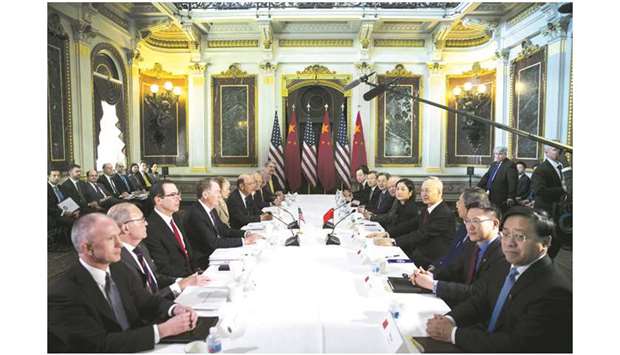Chinese officials expect the US will delay a threatened tariff increase set for Sunday as both sides focus on de-escalating tensions by cutting import taxes currently in place rather than removing specific products from the target list, according to people familiar with the matter.
Beijing sees the removal of the December 15 threat enabling talks to continue on the unfinished items in phase-one of the accord, two officials said on condition of anonymity because the conversations are private.
While the Trump administration has yet to announce any postponement, Agriculture Secretary Sonny Perdue said Monday that he believed there will be “some backing away.”
Reducing the existing tariff rates will enable negotiators to avoid having to choose which among thousands of goods can receive relief.
The US has added a 25% duty on about $250bn of Chinese products and a 15% levy on another $110bn of its imports over the course of a 20-month trade war.
The ongoing discussions illustrate the difficulties in reaching an accord that President Donald Trump said more than eight weeks ago was basically done and would take three to five weeks to put on paper.
Stock futures reversed losses on news of the potential delay.
US Commerce Secretary Wilbur Ross, speaking on Tuesday on Fox Business Network, said getting the right deal is more important than whether it comes before or after December 15. “Every day that goes by, we are in a better negotiating position,” he said, adding that most of the tougher issues will be addressed in later phases of negotiations.
Adding to the tough timeline for the phase-one deal by Sunday is US Trade Representative Robert Lighthizer’s attention this week on getting enough support in Congress to ratify the administration’s revamped free-trade agreement with Mexico and Canada.
A tariff reprieve would lift confidence in the global economy and signal that the two sides are determined to push through a deal, despite heightened tension in the past two weeks over non-trade conflicts including the US stance on Hong Kong’s protests and alleged abuses in China’s Xinjiang province.
As China continues to increase agricultural purchases from the US, officials are also still wrangling over the provisions for future buying in the agreement. The US wants to lock China in a firm schedule of purchases.
China insists that any buying commitments should not conflict with its obligations under World Trade Organisation rules.

Robert Lighthizer, US Trade Representative (centre left), meets with Liu He, China’s Vice Premier and director of the central leading group of the Chinese Communist Party (centre right), during trade talks between the US and China in the Eisenhower Executive Office Building in Washington (file). Chinese officials expect the US will delay a threatened tariff increase set for Sunday as both sides focus on de-escalating tensions by cutting import taxes currently in place rather than removing specific products from the target list, according to sources.
